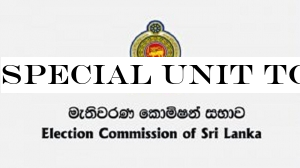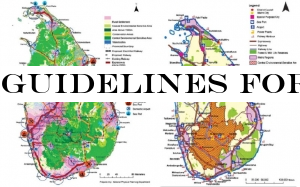Music
Trailers
DailyVideos
India
Pakistan
Afghanistan
Bangladesh
Srilanka
Nepal
Thailand
StockMarket
Business
Technology
Startup
Trending Videos
Coupons
Football
Search
Download App in Playstore
Download App
Best Collections
Srilanka

The Cabinet of Ministers has approved the proposal to amend the Muslim Marriage and Divorce Act.The proposal was tabled by Minister of Muslim Religious and Cultural Affairs Abdul Haleem and Minister of Justice and Prison Reforms Thalatha Atukorale. On the 15th of July, Sri LankaMuslim parliamentarians handed over a proposal to Minister of Justice Thalatha Atukorale today (15) regarding the amendments required to be made to the Muslim Marriage and Divorce Act.
- Details
- Category: Srilanka
Read more: Cabinet approval to amend Muslim Marriage Divorce Act
Write comment (91 Comments)
The third United Nations Conference on the Law of the Sea, which began in 1973, was only concluded with the signing of the Convention in 1982. This conference was convened for the purpose of establishing an equitable regime for the ocean area and it was hoped that the Convention to be produced would finally resolve many matters which had been unresolved. The final test consisting of 320 Articles and 9 annexes together with the final Act deals with all facets of the law of the sea. It is both a codification and progressive development of existing international law as well as a formulation of new rules of law. Sri Lanka among many other countries voted in favour of the treaty and has signed the treaty and is presently a party to the treaty. The Convention came into force in 1994 after obtaining the 60th ratification. Today over 166 States including European Union are parties to the Convention.
The 1982 Convention as a whole can be taken as representing the present international law of the sea. It seems to be a fair inference to draw that the principles embodied in the treaty can be regarded as having the general acceptability of the international community and would be binding even on non parties as customary international law.
The Convention has been constituted out of the two main sources of international law namely custom and treaty. But the other sources too have contributed their share. ‘The Convention has also incorporated the judgments of the International Court of Justice as for example the theory of natural prolongation propounded in the North Sea Continental Shelf Cases which has been adopted as one of the criteria for delimitation of the Continental Shelf, or the concept of the coastal States preferential rights in the adjoining seas as elucidated in the Fisheries Jurisdiction Case which concept has now been tended to comprehend the exclusive economic zone. The general principles of law recognized by civilized nations have also been worked into the text of the Convention as seen in the notion of equity which is the underlying thread which runs through most of the provisions of the Convention and which is a criterion in delimitation of boundaries between adjacent and opposite States.
The Law of the Sea has not been static. It has been dynamic and evolutive in character, changing in response to new dimensions in science and technology, and in which economic and political considerations have had a part to play. In the new Law, principles such as those of equity, equality and environmental considerations, begin to weave their way into the fabric of the Law. We see the greater emphasis on pollution control and protection of the environment stressing the theme of universality, and for the first time the notion of the human species as a subject of rights and duties, which underlies the provisions relating to the brave new concept of the common heritage of mankind, which finds expression in the ‘International Seabed Area&, together with the provisions for an ‘International Seabed Authority&. All these new trends are the outcome of the Third United Nations Conference on the Law of the Sea concluded in 1982.
Old Law and New Law
The new law must also be differentiated from the older or traditional law, which was mainly customary international law which had evolved from the practices of the Western European maritime nations. ‘This law as it began to evolve from about the 17th century stressed the principle of freedom of the high seas. This theory was at that time a departure from the closed sea doctrine which had prevailed in Europe during the earlier centuries.
While the old law stressed the freedom of all nations to use and exploit the high seas, the new law stresses the right of the coastal State to the exclusive use of larger and larger areas of the seas and seabed adjoining their coasts. It was however, recognized that the unchecked expansion of national jurisdiction over the high seas and seabed would also be inequitable as it would give undue advantage to those States which have been geographically favoured with wide coastlines. Hence a distance criteria of 200 miles in the case of the Exclusive Economic Zone and 350 miles in the case of Continental Shelf, has been worked out in the provisions of the 1982 Convention which curtail the effect of unimpeded expansion. Furthermore in respect of the exclusive economic zone provisions have been made for the allocation of surplus resources, keeping in mind the needs of the developing States as well as landlocked and geographically disadvantaged States.
Similarly in the case of Continental Shelf, while the 1982 Convention gives all coastal States 200 miles on the basis of a distance criterion irrespective of the question of natural prolongation of its land territory under the sea, nevertheless it makes provision that in respect of the exploitation of the non- living resources of the Continental Shelf beyond 200 miles, payments and contributions have to be made to the Seabed Authority, which shall distribute them to the State parties to the Convention on the basis of equitable sharing criteria, taking into account the interests and needs of developing States particularly the least developed and the landlocked among them. Thus while recognizing the principle of the preferential right of the coastal State, provision has also been made to give part of these resources to other States of the region as well.
Principle of Common Heritage of Mankind
Another new concept which has had a limiting effect on the principle of national aggrandizement is that of the common heritage of mankind. This evolutionary new concept views the area of the seabed outside national jurisdiction and under the high seas as constituting the common heritage of mankind, the ownership and exploitation of which are vested in all nations. The new doctrine has in mind a collective ownership, which is centrally managed and the resources of this area are to be distributed on the basis of equity. Part XI of the 1982 Convention has given concrete expression to this idea. The deep seabed is demarcated as ‘The Area& and it is expressly stated that the Area and its resources are the common heritage of mankind. The Convention sets out very detailed provisions relating to the setting up of an international seabed Authority and mechanisms for exploiting the resources of the deep seabed. The emerging new law has in this instance introduced a universal approach, transcending narrow national and regional interests.
Baseline defined in the 1982 Convention follows the customary international law as set out in the 1958 Geneva Convention on the Territorial Sea and Contiguous Zone. It states that the low water mark of ordinary spring tides along the coast of the mainland and along the seaward edge of islands, shall be the baseline from which the territorial sea may be measured. The 1958 Convention provides for the drawing of straight baselines where the coast line is deeply intented and cut into or where there is a fringe of islands along the coast in its immediate vicinity. The methods of setting out baselines have been adopted in the 1982 Convention. Article 14 of the Convention states that the coastal State may determine baselines by any of the methods provided for to suit different conditions.
Bay is defined in the 1982 Convention as a well marked indentation whose penetration is in such proportion to the width of its mouth as to contain landlocked waters, and constitute a more than a mere curvature of the coast. In the case of bays which have a mouth wider than 24 miles the Convention provides that a straight baseline of 24 miles within the bay may be drawn so that, the waters on the landward side are internal waters while the territorial sea would be measured from the baseline outwards to the sea.
Territorial Sea
With regard to the territorial sea, there had been a controversy as to how far and on what basis the territorial sovereignty could be said to extend into the seas. In modern times, the Hague Codification Conference of 1930 was in favour of the principle of sovereignty and this term is used in the 1958 Geneva Convention on the Territorial Sea and Contiguous Zone, which states ‘the sovereignty of a State extends beyond its land territory and its internal waters to a belt of the sea adjacent to its coast described as the territorial sea. This sovereignty is exercised subject to the provisions of these Articles and to other rules of international law. The 1982 Convention uses almost the same terminology. It was finally agreed in the 1982 Convention that every State has the right to establish the breadth of its territorial sea up to a limit not exceeding 12 nautical miles. The 12 mile is drawn from the baseline and is the low water mark of ordinary spring tides along the coast. The Convention also made provisions for transit passage in straits used for international navigation.
Article 15 of the 1982 Convention sets out the criteria for delimitation of the territorial sea between States with opposite or adjacent coasts. This section provides for States to demarcate it by agreement, failing which by a median or lateral line, every point of which is equi - distant from the nearest points on the baseline. In the case of Sri Lanka and India, the territorial sea has been delimited by agreement between the two countries.
Innocent passage is a right which customary international law recognizes may be viewed as a right or a privilege given to third States to travel within these waters, while at the same time recognizing the jurisdiction of the coastal State. The right of innocent passage has been incorporated into the provisions of the Geneva Convention on the Territorial Seas and Contiguous Zones of 1958 and into the 1982 Convention of the Law of the Sea. The 1982 Convention specifically sets out the laws and regulations which the coastal State may adopt within its territorial sea in relation to innocent passage which in the main deals with safety of navigation and include such matters as conservation of the living resources of the sea and preservation of improvement of the fisheries laws and the prevention of the infringement of the customs, fiscal, immigration or sanitary laws and regulation of the State.
Civil and Criminal Jurisdiction
The territorial sea being under the sovereignty of a State, State can legislate for this region and has civil and criminal jurisdiction over foreign ships and shipping where they contravene such laws within this region. The State exercises jurisdiction over foreign vessels only where there has been contravention of its law. It is a rule of customary international law that the law of the ships flag governs. This principle has been incorporated into the 1982 Convention in Article 94, which states that every State shall effectively exercise its jurisdiction and control, in administrative, technical and social matters over ship flying its flag on the high seas. Although the flag State has full jurisdiction when the ship is in the high seas, when the ship enters the territorial waters of another State, it must observe the laws of that State. Hence contravention of these laws gives the coastal State jurisdiction. Piracy on high seas is an international law offence but committed on seas within the national jurisdictions, it may not come within Convention definition. Hence it becomes necessary to criminalize all acts of piracy or intent to commit piracy under the national laws as well.
As regards the operation of the Convention, it is evident that the international seabed authority has not been able to perform adequately due to lack of advanced technology. The themes of universality and equitable distribution of marine resources is still to be worked out in the face of competing national claims to resources. Conservation and management of marine resources are not consistently followed. Many States fail to comply with their obligations under the Convention as well as other conventions, which enjoin prohibition on illegal unlimited and unauthorized fishing on the High seas, as well as restrictions on fishing of certain categories of marine species such as whales, and use of prohibited methods fishing, all of which lead to destruction of fish stocks and the ecosystems that sustain fisheries.
However, it must be noted that despite these shortcomings the Conventions has set out a regime for the oceans, and marked the limits of the different sea zones under the jurisdiction of States as well as the legal regime in zones under the jurisdiction of States as well as the legal regime in the different zones. It has set the standards in respect of marine conservation and management, marine research and transfer of marine technology and pollution prevention and control. Not least of all it has set out the dispute mechanism systems in Chapter XV. This section provides for settlement of disputes by peaceful means through agreement or conciliation, or under compulsory procedures entailing binding decisions.
The Courts designated under the Convention are as follows: the International Tribunal for the Law of the Sea, the International Court of Justice, an arbitral tribunal constituted under Annex vii, and special arbitral tribunal constituted under Annex viii. It is noteworthy that the courts and tribunals have issued judgements and made awards determining a great number of maritime boundary delimitation disputes between States as well as other maritime matters. The dispute settlement mechanism has helped to diffuse tensions between States and to maintain the rule of law in the ocean.
The Convention can be looked at in a larger perspective too, as setting out at least in relation to the general principles, the new regime of the law of the sea, and hence applicable to Sri Lanka not only as treaty law, but also as part of the general International Law.
(The writer is a Retired Professor in Law in University of Sri Jayewardenepura. He is an Attorney at- Law with Ph.D in Law as well).
Email Facebook0 Twitter google_plus Pinterest0 WhatsApp Viber Facebook Messenger
- Details
- Category: Srilanka
Read more: Current Global Legal Regime on Sea
Write comment (100 Comments)
Parliament approves new regulations under Intellectual Property Act
Parliament approved several regulations introduced under the Intellectual Property Act on royalty payment mechanisms for rights-holders of songs or other musical work, and on empowering collective societies.Both government and Opposition parliamentarians were supportive of the proposed regulations, considering numerous injustices faced by artistes due to loopholes in intellectual property laws. The regulations were published in the Gazette Extraordinary No.2128/6 of June 17.
Opening the debate on the regulations to the Intellectual Property Act; Non-Cabinet Minister for Science, Technology, and Research, Sujeewa Senasinghe; said that there were issues relating to the implementation of intellectual property laws in countries such as Sri Lanka.
&The Intellectual Property Act came under my Ministry only recently. We had to come up with a mechanism to protect the intellectual property rights of our artistes. Presently, there are two organisations established to assist artistes regarding this and I believe more organisations will be set up after we carry out awareness programmes on these rights,& Senasinghe said.
&We hope for the participation of all artistes in this initiative. We would like to increase the efficiency of the Intellectual Property Actimplementation by getting the assistance of new lawyers. We need the assistance of all artistes to make this endevour a success,& he added.
Janatha Vimukthi Peramuna (JVP) MP Nalinda Jayatissa, joining the debate, questioned Senasinghe if the government had taken any steps to make private TV and radio channels provide the payments related to intellectual property.
In reply, Senasinghe said that the government would extend its awareness programmes to TV and radio channels, and would also take steps to computerise all details related to intellectual properties. He added that the government would establish a system through which all parties who have contributed to musical content would receive their due royalty payments.
MP Jayatissa also pointed out that no royalty payments had been provided to the lyricists and music composers of the Sri Lanka Police anthem.
United National Party (UNP) MP Prof. Ashu Marasinghe said that the regulations introduced by the extraordinary gazette were of utmost importance for the betterment of the artistes in the country. He added that societies active on intellectual property rights should be established focusing on every field of arts.
Prof. Marasinghe also said the Sri Lanka Rupavahini Corporation and the Sri Lanka Broadcasting Corporation should strictly follow the Intellectual Property Act—if not, the government should take measures to regulate such actions. United PeopleFreedom Alliance (UPFA) MP Bandula Gunawardena said that writers also have many issues with royalty payments:
&Without a publisher, it is quite difficult for writers to print their books as author publications. We should take precautions to stop other people from scamming the royalty payments for books whose authors have passed away,& he said.
&We need a proper system to ensure the royalty payments of our artistes. It is the governmentresponsibility to make a better future for the artistes in the country,& the parliamentarian added.
Dispute over H&tota job-seekers employed at K&gala CCF sites
Chief Whip questions MP Jayasekaraobjection
Chief Government Whip Gayantha Karunatileka inquired yesterday in Parliament from MP Dayasiri Jayasekara if he was against those from Hambantota contesting for elections in Kurunegala.
He queried from MP Jayasekara when the latter questioned about offering jobs to those from Hambantota at Central Cultural Fund (CCF) sites in Kurunegala that come under the Housing and Cultural Affairs Ministry.
&Are you against us giving jobs to those from Hambantota or are you against those from Hambantota contesting the elections in Kurunegala?& Karunatileka asked. MP Jayasekara answered in the negative.
MP Karunathilake asked if the United PeopleFreedom Alliance (UPFA) was having in-house differences over providing opportunities to job-seekers from Hambantota.
Opposition Leader Mahinda Rajapaksa told the government that the UPFA could sort its in-house differences without the help of the latter.
Probable monopoly in fuel transportation sector
Plans afoot for high-tech monitoring system: Minister
Highways and Road Development and Petroleum Resources Development Minister Kabir Hashim said in Parliament, yesterday, that there seems to be a certain level of monopoly in the fuel transportation sector.
Hence, the ministry has made plans to employ a high-tech monitoring system to prevent malpractices, he said.
Minister Hashim said the government would provide opportunities to private bowser owners willing to transport fuel under comprehensive charges, adding that plans were also afoot to introduce a nondiscriminatory payment system for these private bowser owners
In reply to a question raised by Parliamentarian Hesha Withanage, Minister Hashim said that there were 421 members in the Ceylon Petroleum Private Bowser Owners& Association. He also said that there was a total of 743 bowsers privately hired by the Ceylon Petroleum Storage Terminal, as well as 150 bowsers hired by the Ceylon Petroleum Corporation.
&When I went through the list of members, I saw that some companies owned around 15 bowsers. Some owned three bowsers. All these opportunities were given in the years 2010, 2011, and 2012. Now, we are open to anybody who owns a bowser to join us if they are offering fair prices,& the minister said.
‘Mobile district secretariat to resolve land issues in Kilinochchi&
Chief Government Whip Gayantha Karunatileka said that the government has decided to set up mobile district secretariats to resolve land-related issues in Kilinochchi.
The minister was replying to Tamil National Alliance (TNA) Parliamentarian S. Sritharan, who highlighted that the war-affected people in Kilinochchi were mortgaging their lands and obtaining loans from banks and other financial institutions due to poverty.
&There are others who cannot find redress even after selling their lands and many families have been denied of their freehold land titles though they have been living there for over 60 years,& Sritharan said, &It is unfair to people who survived the brutal war to suffer again owing to the delays in departments.&
In reply, Chief Government Whip Karunatilake said, &Issuing land deeds to them would be a complex task and would involve several ministries to cooperate.&
&However, we have decided to set up several special mobile district secretariats to find solutions to their issues. You could ask people who have been deprived of their deeds to come there.&
Inquiry into overdue SriLankan payments
COPE recommends legal action against Presidential Secretariat, MFA
The Committee on Public Enterprise (COPE) recommended taking legal action against the Presidential Secretariat and the Ministry of Foreign Affairs (MFA) for not settling payments amounting to Rs.123 million due on SriLankan Airlines for certain transactions that have taken place during the previous regime.
According to COPE Chairman and Janatha Vimukthi Peramuna (JVP) MP Sunil Handunnetti, the Presidential Secretariat owes Sri Lanka Airlines a sum of Rs.114 million, while the Foreign Affairs Ministry owes an amount of Rs.9 million.
The recommendation was pronounced yesterday at the COPE proceedings held in Parliament. Representatives of SriLankan Airlines were summoned for the COPE inquiry.
Handunnetti said the payments are related to the misuse of the national carrier by those attached to the said two government bodies during the previous regime, where they have used the airline service without purchasing tickets.
COPE proceedings are now open to the media.
Holidays (Amendment) Bill
consistent with Constitution: SC
The Holidays (Amendment) Bill, the private member bill moved in order to amend the Holidays Act No.29 of 1971, is consistent with the Constitution, the Supreme Court informed Parliament in its determination.
Citing the two petitions filed on par with the Provisions of Article 121 (1) of the Constitution, the Supreme Court has recommended changes to bring in more clarity to the amendments, Deputy Speaker and the Chair of Committees, J.M. Ananda Kumarasiri, informed Parliament, yesterday.
He said this while reading the SpeakerAnnouncements in the Parliament.
Rs.29.174 bn Supplementary
Allocation presented in Parliament
A Supplementary Allocation of Rs.29.174 billion was presented in the Parliament for approval by the government, yesterday.
Chief Government Whip Gayantha Karunatileka presented the supplementary allocations released from Supplementary Support Services and Contingent Liabilities Project appearing under Expenditure from June 1 July 15.
The Supplementary allocations had been made for 112 projects, including an allocation of Rs.200 million for the establishment of the Palmyrah Fund, as well as Rs.260 million for the construction of houses for war-affected families in the North and the East and Rs.400 million for the Uva Wellassa Physical and Human Resources Development Project.
Government withdraws State Land (Special Provisions) Bill
The government withdrew the State Land (Special Provisions) Bill in Parliament, yesterday.
Public Enterprise, Kandyan Heritage, and Kandy Development Minister Lakshman Kiriella withdrew the bill, which was in the order paper for the second reading debate.
Minister Kiriella said that the objective of the government was to grant land deeds to 2.5 million people who are deprived.
The government presented a bill as a solution to it, yet the Opposition members went to courts to prevent it, he said, adding that hence, there was a legal issue in passing it.
Minister Kiriella said that the Opposition stood against the governmentmove to grant plots of lands to poor.
Lands overrun with giant mimosa
‘Rs.125,000 needed to clear one hectare&
Mahaweli Development and Environment Minister Ajith Mannapperuma said in Parliament, yesterday, that Rs.125,000 was required to clear one hectare of land overrun with invasive giant mimosa plants.
He added that 360 hectares of the country are covered with the plant; 40 hectares of land around the Victoria Reservoir and 110 hectares in Kotmale, too, had been affected. It would take four years to eradicate the plant completely, he said; &We are working on the issue, but we lack the funds for it.&
He added that a sum of Rs.50,000 was required to clear one hectare of such an infested land in its second year.
He said that countrymain water bodies, including tanks and reservoirs, have also been overrun with mimosa—that had been allowed to grow by the governments in the 1960s and the 1970s, thinking that it would help protect the Mahaweli river banks. He added that the governments that were there before the Mahaweli Project was initiated promoted the spreading of mimosa.
He said so responding to a question raised by United National Party Parliamentarian Rohini Kumari Wijerathna, who urged the government to take immediate action to save the countrywater bodies from the invasive plant. The minister said that the government had been working on a project to eradicate the invasive plant, and that the project began in 2016.
MP Wijerathna queried of the success of the project if it started in 2016, adding that even after three years, many water bodies had still been overrun with the plant. She added that the situation has inconvenienced many farmers. The plant has invaded many areas around the Bowatenna Reservoir in Naula and Matale, she added.
MP Wijearathna said that mimosa seeds could germinate even seven to eight years later.
The country has many development officers and agriculture research assistants, in addition to several others holding such ‘white elephant& posts, she said, adding that they must take part in the endeavour to eradicate the plant.
Minister commends security provided to Dalada Perahera
Public Enterprise, Kandyan Heritage, and Kandy Development Minister Lakshman Kiriella commended the security forces and the police for the provision of security to the Kandy Dalada Perahera.
The minister said yesterday that the perahera was a success.
Hence, he said he thanks the police, the Special Task Force, and the Tri-Forces, on behalf of all Kandyans.
Minister Kiriella added that, as the Kandy Perahera was a historic event, it should not be suspended over security threats.
The minister told Parliament, on July 21, that there was information that Islamic terrorists had planned an attack on the Kandy Esala Perahera and demanded adequate security.
‘Measures afoot to take Madrasa schools under Education Ministry&
Education Minister Akila Viraj Kariyawasam said yesterday that measures were afoot to take the Madrasa Schools under the Education Ministry.
He added that discussions were in progress with the Muslim Religious Affairs Ministry over the matter.
The minister said so in response to queries made by MPs Chaminda Wijesiri and Ananda Aluthgamage. Minister Kariyawasam also said that international schools and private schools would be monitored under the new Education Act that is to be proposed.
- Details
- Category: Srilanka
Read more: Parliament approves new regulations under Intellectual Property Act
Write comment (93 Comments)
The Elections Commission has set up a special permanent unit to monitor election violence and the breaching of election laws and regulations at future elections. It is headed by Additional Commissioner of Elections (Legal and investigations).
- Details
- Category: Srilanka
Read more: Special unit to monitor polls related violence
Write comment (98 Comments)
Megapolis and Western Development Minister Patali Champika Ranawaka yesterday said the future investment and infrastructure projects should conform to the regulations and guidelines of the National Physical Planning Policy and Plan & 2050 which has been completed by a team of local experts.The 2050 Plan compiled by the National Physical Planning Council (NPPA) which has been approved through a gazette, aims to promote and regulate the integrated planning of economic, social, physical and environmental aspects of land and territorial waters of Sri Lanka.
- Details
- Category: Srilanka
Read more: Guidelines for future investment and infrastructure projects
Write comment (92 Comments)
Windy condition over the island, particularly in Northern, North-central, North-western provinces and in Trincomalee, Hambantota districts up to 50 kmph at times and the showery condition in South-western part of the island is expected to enhance to some extent during next few days. Showers or thundershowers will occur in Western, Central, Sabaragamuwa, Southern and North-western provinces and in Mannar and Jaffna districts.Showers or thundershowers will occur at a few places in Ampara, Batticaloa and Badulla district after 2.00 pm. Heavy falls about 100 mm are likely at some places in Sabaragamuwa province and in Nuwara-Eliya, Kalutara, Galle and Matara districts. Fairly heavy falls above 50 mm are likely at some places in North-western province and in Colombo and Gampaha districts. There may be temporary localized strong winds during thundershowers. General public is kindly requested to take adequate precautions to minimize damages caused by lightning activity.
- Details
- Category: Srilanka
Read more: Winds and rain to enhance during next few days
Write comment (95 Comments)Page 270 of 392

 8
8





